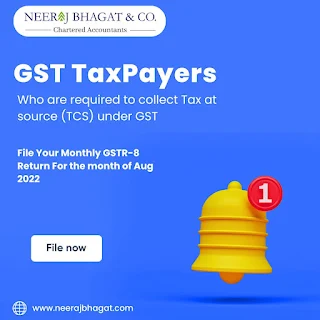We are prominent Chartered Accountants in Delhi.
We offer accounts outsourcing, auditing, company formation in India, Business taxation, Tax consulting in India, etc.
Best Chartered Accountant in Delhi | Top Tax Consultants in Dwarka/ Delhi
GST Discounts on Products In the domain of worldwide exchange, the Labor and Products Duty (GST) has achieved a progressive change, smoothing out processes and advancing the simplicity of carrying on with work. The ability to claim GST refunds on exports is one of the main benefits of GST for exporters. Let's go on a journey to learn the ins and outs of this process. 1. Eligibility Requirements to Make a GST Refund Claim on an Export Exporters are eligible to make a GST refund claim on an export if they meet certain eligibility requirements. To be qualified, an exporter must: have exported goods or services, even if they were deemed to be exported. Have substantial GST enrollment. Have paid IGST (Integrated GST) on exports or accumulated input tax credit (ITC) on input and input services, and submit a valid GSTR-3B return. 2. Sending out Labor and products under GST Sending out under GST envelops both the actual development of merchandise across borders as well as the stock of administrations to an unfamiliar element. Trades are treated as "zero-evaluated supplies," suggesting that the sent-out merchandise/administrations are charged an ostensible GST pace of 0%. This is finished to advance seriousness in the global market and forestall the twofold tax collection from labor and products. 3. GST Discount Cycle for Exporters The most common way of asserting GST discounts on trades includes the accompanying advances: Exporters are required to submit Form GSTR-1 detailing their exports. The beneficiary of the products/administrations ought to affirm the receipt by recognizing the subtleties referenced in the GSTR-2A structure. Exporters then, at that point, need to outfit Structure GSTR-3B, including the subtleties of their commodities. The discount sum will be credited to the ledger of the exporter after a due check by the duty specialists. 4. Documents to Attach for Export GST Refunds When applying for an export GST refund, exporters are required to attach a set of supporting documents. The most common of these are Copies of the export or shipping bill. Duplicate of the commodity receipt. Duplicate of the pertinent bank acknowledgment testament. A statement affirming that the ITC has not been guaranteed. Some other reports as determined by the specialists. 5. Correction on Form GSTR-1 Exporters can make corrections on subsequent returns if there are inconsistencies or modifications required on the Form GSTR-1 after it has been submitted. The accuracy of the export details can be ensured by making corrections to the data in subsequent GSTR-1 returns. 6. Changes or corrections to Form GSTR-3B can be made in subsequent months if they are required after the form has been submitted. This adaptability permits exporters to correct any blunders or errors that might have emerged during the underlying recording. In conclusion, the export GST refund system is an important incentive for exporters that helps international trade grow. By zero rating sent out, GST guarantees that Indian labor and products stay serious on the worldwide stage. Nonetheless, exporters should comply with the specified strategies and rules to guarantee their discounts effectively. The smoothed-out process benefits organizations as well as adds to the country's economy by supporting products and upgrading exchange connections around the world.
For more details - https://neerajbhagat.com/










